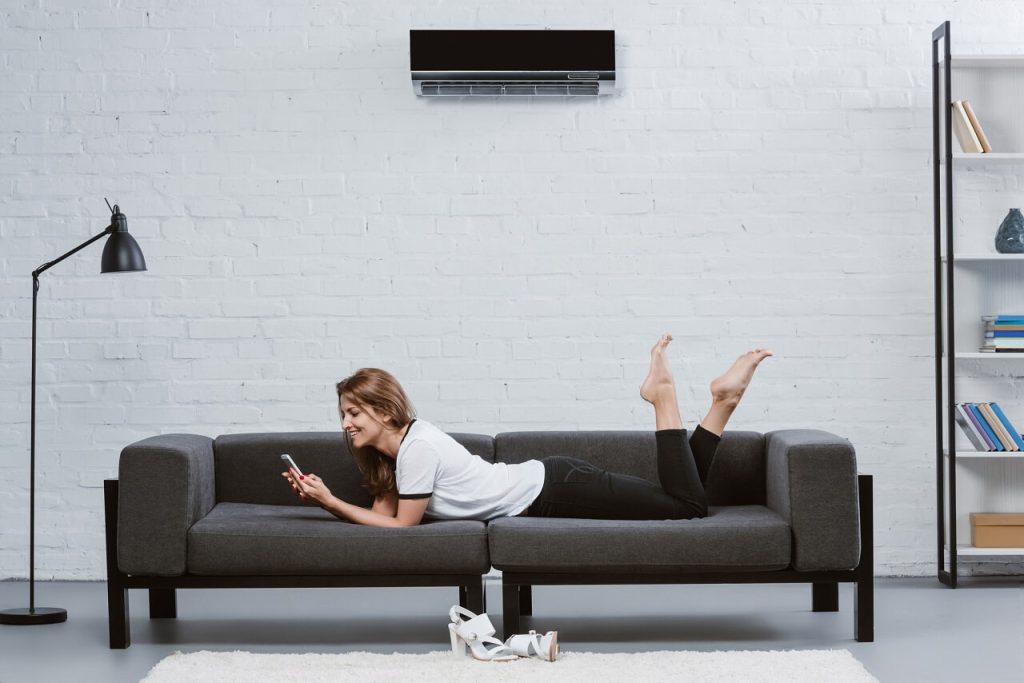Air coolers and air conditioners are both used to make a space cooler and more comfortable. But they work differently and each is suitable for different kinds of conditions.
In this quick guide, we explain the difference between an air cooler and air conditioner and which one you should get depending on your situation and needs.
What Is An Air Cooler and How Does It Work?
An air cooler, also called an evaporative cooler or a swamp cooler, is a space cooling device that uses water to produce cool humid air.
An air cooler works roughly the same way as wind blowing over a lake. As the wind picks up moisture (by evaporation), it loses heat and gets cool. What reaches you on the shore is a cool wind.
In an air cooler there’s a water reservoir where you add water and ice. Water pads absorb the water in the tank. A fan then blows warm air over the wet pads, causing the water to evaporate and the air to get cooler.
The cooler air is then blown out into the room.
How Does an Air Conditioner Work?
Most people are familiar with an air conditioner, whether it’s a portable AC, a window AC, or a central AC.
They all work the same way.
Warm air is forced into the air conditioner. In the AC, a refrigerant pulls heat from the air, cooling it.
The AC transports the heat (and excess humidity) outside the house while the cool air is distributed inside the room or house.
Differences Between an Air Cooler and Air Conditioner

Here are 6 of the biggest differences between an air cooler and an air conditioner.
1. Temperature control
Most air coolers don’t have a thermostat, thus there’s no temperature control. In other words, you cannot set a specific room temperature like 20C.
The only way to control how much cooling an air cooler provides is adjusting fan speed (higher fan speed results in more cooling) or selecting specific cooling modes like fan-only.
In contrast, air conditioners provide precise temperature control. Most have a digital thermostat allowing you to set a specific temperature that the air conditioner will maintain.
2. Ideal conditions for use
Air coolers work best in dry (low humidity) areas. That’s because the drier the air is, the more moisture it can absorb and the colder it can get.
Using an air cooler in a humid area causes two problems.
- Limited cooling performance. Because the air is already humid, it doesn’t evaporate the water in the air cooler. So the air being blown out is not cool.
- Excess humidity. Humid air will still pick up a bit of moisture and get more humid. This can make the room feel muggy and uncomfortable. It also raises the ‘feels like’ temperature, making you feel excessively hot.
Air conditioners, on the other hand, work well in any kind of environment. An air conditioner will keep you comfortable regardless of relative humidity.
3. Price
Another big difference between air conditioners and coolers is price.
Air conditioners are more expensive than air conditioners. Even a portable AC for use in a single room will cost you a few hundred pounds.
In contrast, you can get a powerful air cooler for a large room for under £100.
4. Power consumption
The high cost of an air conditioner doesn’t end with the price tag. Even after you bring it home and install it, an air conditioner costs more to run.
That’s because it uses more electricity. Most portable air conditioners have a power consumption of 1000W or higher.
With an air cooler, power is used mostly to run a fan. A typical air cooler will use between 50W and 60W.
5. Installation
Air coolers are mostly plug and play. All you need to do is add water and ice to the reservoir and then plug in the unit.
And if you need to move it to another room, you simply carry or push it (most air coolers have casters for easy mobility).
Air conditioners need to vent hot air and moisture outside the house. If you get a portable AC, you have to vent it through a window or door as shown in the video below.
Moving it to another room requires taking down the venting hose and setting it up again in the other room.
Central AC requires extensive and expensive installation that can only be done by a pro.
6. Comfort and cooling performance
Air conditioners easily win when it comes to cooling performance. Regardless of the ambient temperature and humidity, you can have an AC cool you to a comfortable temperature.
An air cooler can also keep you comfortable, but only in the right conditions. And even then, it’s not as effective as an air conditioner.
You also have to keep refilling the tank with water and ice.
Which Is Better Between An Air Cooler vs. Air Conditioner?
Considering all the above, which one should you get between an air cooler and an air conditioner. Here’s what we recommend.
Buy an air cooler if:
- You live in a low humidity area. Generally, air coolers work best conditions with relative humidity of 60% or less.
- You are looking for a cheaper alternative to an air conditioner.
- You want more cooling than a fan provides, but don’t want to spend a lot of money on an air conditioner.
- You want to cool and humidify your home. An air cooler does both.
Buy an air conditioner if:
- You live in a high humidity area (over 60%) where an air cooler wouldn’t work as well.
- You want the best cooling performance you can get. An air conditioner is especially ideal when it’s really hot and you need fast and effective cooling.
- You want to be able to keep a room or the entire house at a precise temperature.
- You don’t mind the higher price and operating costs of an air conditioner.
- You want to cool and dehumidify your home. An air conditioner does both.




